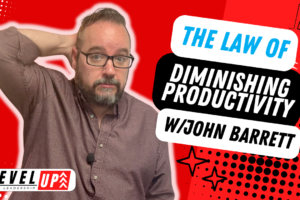Time Management Is Secondary
Time management has been the buzzword for many years in the productivity world. There are thousands of resources, seminars, strategies, and talks built around the subject.
But now, we are learning that time management is actually a secondary priority to a more powerful strategy that trumps it. As it turns out time management is not the primary concern if you want to produce at the highest level. The more important concern is energy management. You see, if your energy level is low you bring your least focus to the time you allotted for working. Just because you schedule a specific time slot on the calendar to get something done does not mean you will be at your best to complete it. Your energy level determines how quickly you can accomplish a task and the quality of the task accomplished. When you are at your best, your productivity is at its best. When you do something is as important as what you are doing. What takes you an hour to do when your energy is low could take you thirty minutes to do when your energy is high. Every person has different energy moments throughout the day and it is vital that what you do is in alignment with the proper energy to do it.
Time is not created equal. In fact, the ancient Greeks had two terms for time. They referred to the first concept as Chronos, meaning consecutive time. This is where we get the word chronological. It basically just means the passing of the clock. But then there is a second term that is much more powerful and is called Kairos. This is the word for the opportune time. A moment that arises within Chronos is an opportunity to capitalize on. Kairos is the moment that can change everything. In the times before modern harbors, a sailor had to wait for the flood tide before they could make it to port with their ship. The Latin phrase “Ob Portu” referred to that moment in time when the tide turned. The captain and crew would wait for that one Kairos moment, knowing that if they missed it, they would have to wait for another tide to come in. The English word opportunity derives from this original meaning. Shakespeare used this idea of “Ob Portu” in one of his most famous passages from Julius Caesar:
There is a tide in the affairs of men,
Which, taken at the flood, leads on to fortune;
Omitted, all the voyage of their life
Is bound in shallows and in miseries.
On such a full sea are we now afloat;
And we must take the current when it serves,
Or lose our ventures.
Kairos moments present us with an opportunity to go further faster. It’s like hitting the triple word score on the Scrabble board; it compounds our effectiveness. The more Kairos moments you can create, the more you will be able to accomplish. And the more you protect your energy, the more you can control your output. Productivity is not about doing more all the time, it’s about doing more in your best time.
Here are some tips to help you figure out your when:
1) Track Your Energy Levels
Take the next few weeks to track your energy from the moment you wake up till the moment you go to bed. Keep a journal along with your schedule and write down, not only what you did, but how felt when you did it.
- When did you feel unfocused?
- When did you feel most alert?
- When did you feel excitement?
- When did you feel exhausted?
Discipling yourself to do this will give you incredible insight into your true energy levels throughout the day. You will see patterns of behavior that will clue you into your Kairos moments.
2) Make A List Of Energy Drainers & Energy Drivers
For everything you do, it will either drain your energy or drive your energy. We have all had those moments that absolutely drain us when we are finished doing what we did. We have also had those moments that tend to drive our energy forward and give back to us when we are finished. Make a note of tasks that tend to affect you. Knowing what is an energy drainer or an energy driver gets you one step closer in pulling back to propel forward.









